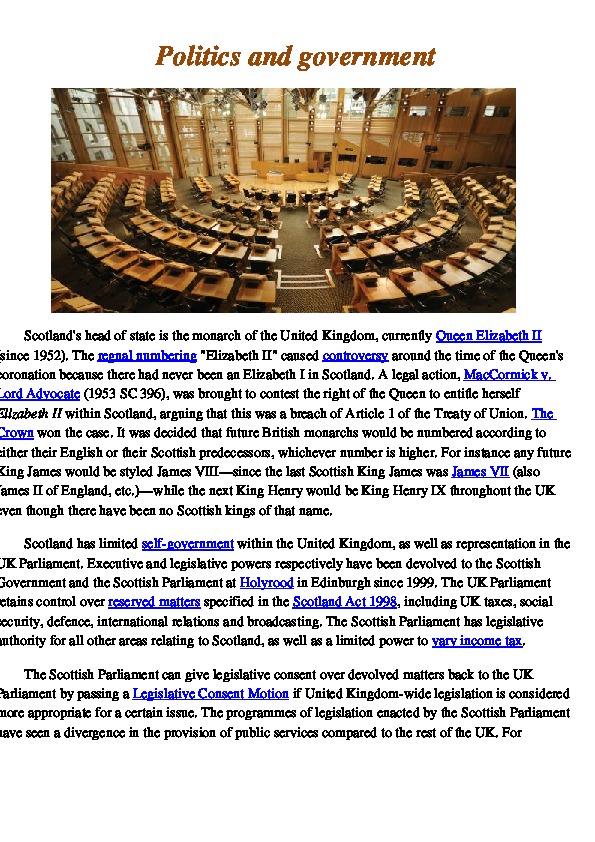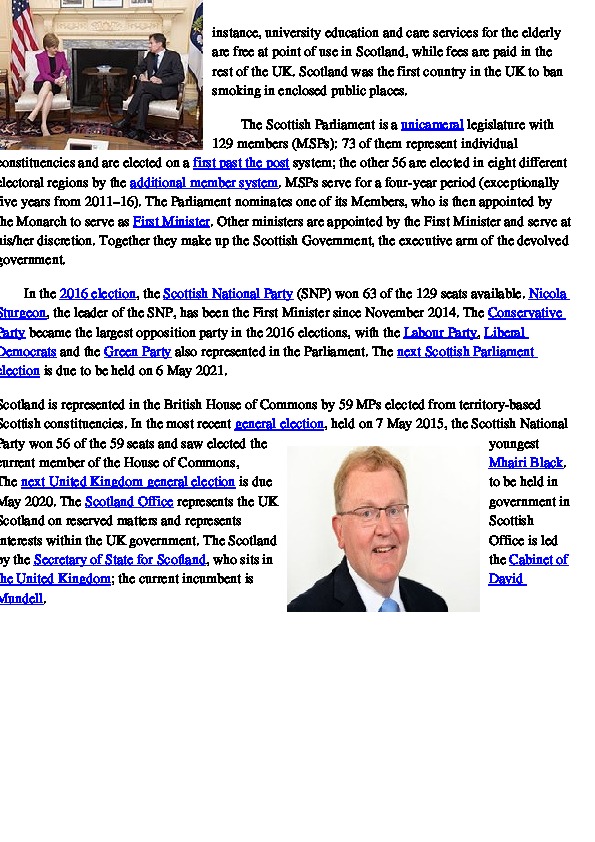Краткое описание документа:
Scotland's head of state is the monarch of the United Kingdom, currently Queen Elizabeth II (since 1952). The regnal numbering "Elizabeth II" caused controversy around the time of the Queen's coronation because there had never been an Elizabeth I in Scotland. A legal action, MacCormick v. Lord Advocate (1953 SC 396), was brought to contest the right of the Queen to entitle herself Elizabeth II within Scotland, arguing that this was a breach of Article 1 of the Treaty of Union. The Crown won the case. It was decided that future British monarchs would be numbered according to either their English or their Scottish predecessors, whichever number is higher
Politics and government
Scotland's head of state is the monarch of the United Kingdom, currently Queen Elizabeth II
(since 1952). The regnal numbering "Elizabeth II" caused controversy around the time of the Queen's
coronation because there had never been an Elizabeth I in Scotland. A legal action, MacCormick v.
Lord Advocate (1953 SC 396), was brought to contest the right of the Queen to entitle herself
Elizabeth II within Scotland, arguing that this was a breach of Article 1 of the Treaty of Union. The
Crown won the case. It was decided that future British monarchs would be numbered according to
either their English or their Scottish predecessors, whichever number is higher. For instance any future
King James would be styled James VIII—since the last Scottish King James was James VII (also
James II of England, etc.)—while the next King Henry would be King Henry IX throughout the UK
even though there have been no Scottish kings of that name.
Scotland has limited selfgovernment within the United Kingdom, as well as representation in the
UK Parliament. Executive and legislative powers respectively have been devolved to the Scottish
Government and the Scottish Parliament at Holyrood in Edinburgh since 1999. The UK Parliament
retains control over reserved matters specified in the Scotland Act 1998, including UK taxes, social
security, defence, international relations and broadcasting. The Scottish Parliament has legislative
authority for all other areas relating to Scotland, as well as a limited power to vary income tax.
The Scottish Parliament can give legislative consent over devolved matters back to the UK
Parliament by passing a Legislative Consent Motion if United Kingdomwide legislation is considered
more appropriate for a certain issue. The programmes of legislation enacted by the Scottish Parliament
have seen a divergence in the provision of public services compared to the rest of the UK. Forinstance, university education and care services for the elderly
are free at point of use in Scotland, while fees are paid in the
rest of the UK. Scotland was the first country in the UK to ban
smoking in enclosed public places.
The Scottish Parliament is a unicameral legislature with
129 members (MSPs): 73 of them represent individual
constituencies and are elected on a first past the post system; the other 56 are elected in eight different
electoral regions by the additional member system. MSPs serve for a fouryear period (exceptionally
five years from 2011–16). The Parliament nominates one of its Members, who is then appointed by
the Monarch to serve as First Minister. Other ministers are appointed by the First Minister and serve at
his/her discretion. Together they make up the Scottish Government, the executive arm of the devolved
government.
In the 2016 election, the Scottish National Party (SNP) won 63 of the 129 seats available. Nicola
Sturgeon, the leader of the SNP, has been the First Minister since November 2014. The Conservative
Party became the largest opposition party in the 2016 elections, with the Labour Party, Liberal
Democrats and the Green Party also represented in the Parliament. The next Scottish Parliament
election is due to be held on 6 May 2021.
Scotland is represented in the British House of Commons by 59 MPs elected from territorybased
Scottish constituencies. In the most recent general election, held on 7 May 2015, the Scottish National
Party won 56 of the 59 seats and saw elected the
current member of the House of Commons,
The next United Kingdom general election is due
May 2020. The Scotland Office represents the UK
Scotland on reserved matters and represents
interests within the UK government. The Scotland
by the Secretary of State for Scotland, who sits in
the United Kingdom; the current incumbent is
Mundell.
youngest
Mhairi Black.
to be held in
government in
Scottish
Office is led
the Cabinet of
David


